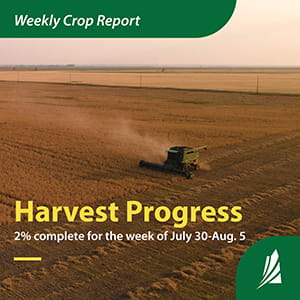Released on August 8, 2024
Crops continue to rapidly advance with the increased temperatures and lack of moisture experienced throughout much of the province this past week. Conditions have led to a further decline in yield potential for some crops. Although any moisture received would be too late for advanced crops, producers indicate moisture would still be beneficial for later seeded crops to help with grain fill along with supporting pasture conditions.
The heat and dry conditions have brought harvest on quickly in some regions of the province. Provincially, harvest is now two per cent complete. This is aligned with the five-year and 10-year averages of two per cent. Harvest progress is led by the southwest region with four per cent complete, followed by one per cent complete for the southeast and east-central regions. All other producers are preparing for harvest by getting equipment ready, cleaning out bins and hauling grain.
In areas that have started harvest, producers have been working on taking off their winter cereals and pulse crops. Provincially, fall rye is 15 per cent harvested followed by winter wheat at 12 per cent harvested. Nine per cent of field peas have been harvested and eight per cent of lentils have been harvested.
Many producers are wrapping up their haying and silage operations. Provincially, dryland alfalfa yields are estimated to be 2.13 tonnes per acre, while greenfeed is estimated to be 2.63 tonnes per acre. Irrigated alfalfa yields are estimated to be 2.79 tonnes per acre, with greenfeed yield estimated at 3.34 tonnes per acre. Silage yields are estimated to be 5.67 tonnes per acre provincially.

Rainfall was variable over the past week with many areas receiving little to no rainfall. The highest rainfall recorded fell in the Christopher Lake area at 42 mm, followed by the Foam Lake area at 36 mm. The Marengo area received 32 mm and the Prince Albert area received 30 mm over the past week.
Topsoil moisture continued to decline this week. Provincially, cropland topsoil moisture is rated as 29 per cent adequate, 53 per cent short and 18 per cent very short. Hayland topsoil moisture is reported at 27 per cent adequate, 51 per cent short and 22 per cent very short. Pasture topsoil moisture is 20 per cent adequate, 50 per cent short and 30 per cent very short.
The lack of moisture and heat continues to be the main cause of crop damage across the province. Wind, aphids and grasshoppers also caused crop damage over the past week with varying degrees of damage reported. As canola continues to mature, producers are observing sclerotinia stem rot emerging in their fields.
Harvest is a stressful time for producers, and they are reminded to take safety precautions and fire prevention measures in all the work they do. The public is also reminded to give machinery extra space and time when travelling on roadways. The Farm Stress Line is available to provide support to producers toll free at 1-800-667-4442.
A complete, printable version of the Crop Report is available online - Download Crop Report.
Follow the 2024 Crop Report on Twitter at @SKAgriculture.
-30-
For more information, contact:

